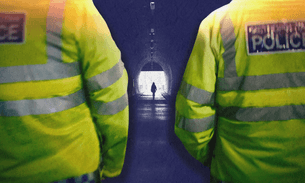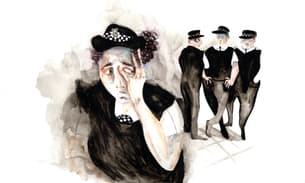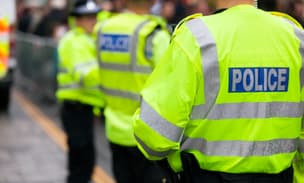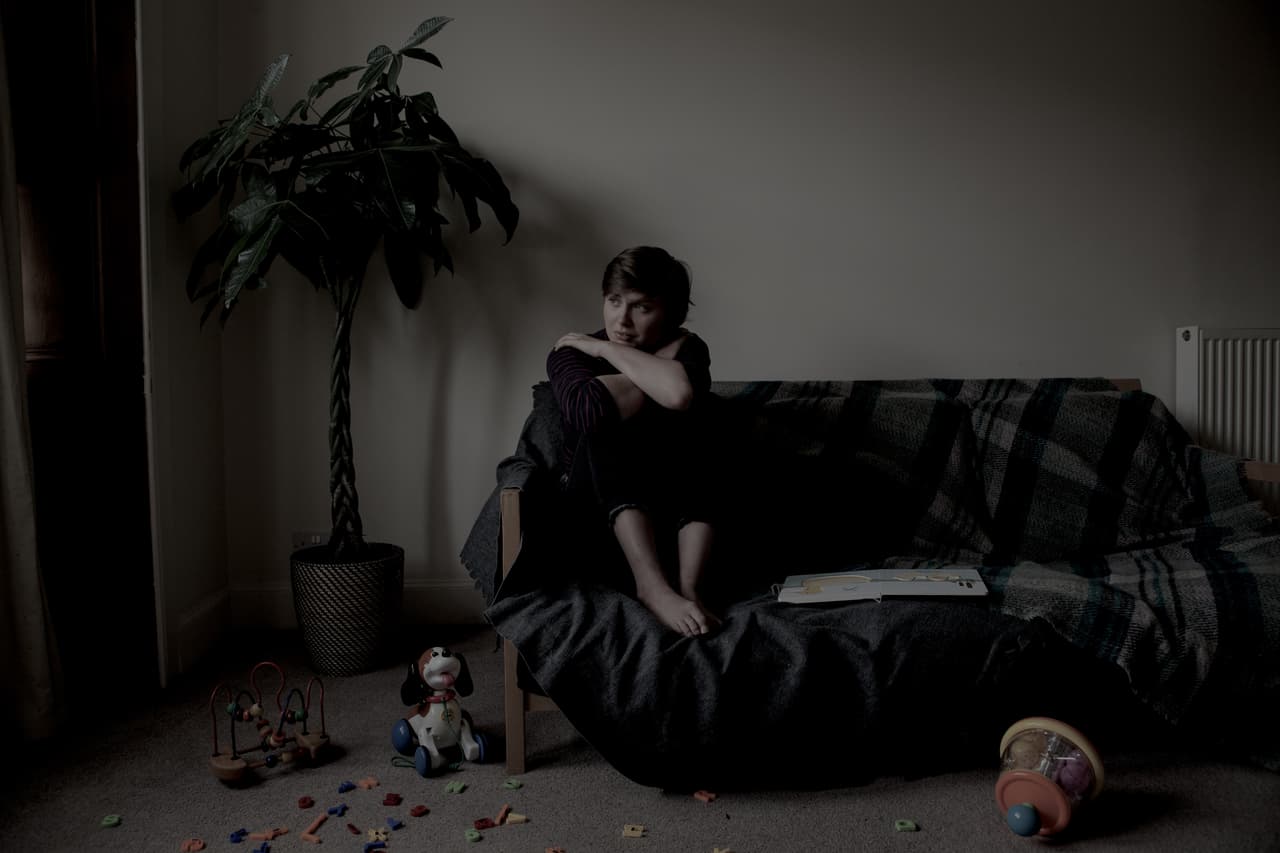
Questions raised over patchy take-up of domestic violence law
Data obtained by the Bureau of Investigative Journalism raises questions about the use of a new law aimed at tackling domestic abuse. The findings come as a government report estimates 1.2m women and 713,000 men have suffered domestic violence in the past year.
Coercive and controlling behaviour was introduced as a criminal charge nearly two years ago, to address more insidious forms of abuse such as preventing victims from seeing friends, stopping them from having hobbies, controlling their finances or even where they are allowed to go.
The introduction of the charge was heralded by then-Home Secretary Theresa May, who described coercive behaviour as “tantamount to torture”. It gained prominence as part of a long running story line in the radio soap opera, The Archers.
The government report from the Office of National Statistics (ONS) finds that 4,246 such offences were recorded in England and Wales in the year up to March 2017.
While the report provides the first official snapshot of how often the crime has been logged with the police, it does not detail how many charges were brought.
The Bureau obtained new figures not released in the report and found some police forces in England had brought just a handful of charges in the first year-and-a-half since the law was introduced.
We submitted Freedom of Information requests to 39 police forces in England, to see how many charges had been laid since the law was implemented at the end of December 2015. Of the 29 who responded, we found a mixed picture, with six forces bringing five charges or fewer since the law was rolled out, with the overall figure being 532 for all forces that responded.
At least 22 forces across England had seen fewer than two charges per 100,000 population in the same time period.
Police forces acknowledged the sluggish take-up, telling the Bureau that charges are “hard to achieve” and “challenging to prove”.
The data released by the Bureau builds on concerns raised by an official police inspector's report, analysis by the College of Policing and work from a leading criminologist who have all noted that police forces are grappling with the new offence.
 Stock image of a distressed woman
Stock image via Shutterstock
Stock image of a distressed woman
Stock image via Shutterstock
The Bureau’s findings chime with a report published earlier this month from Her Majesty's Inspectorate of Constabulary and Fire & Rescue Services (HMICFRS). The report explored police forces’ response to domestic abuse and found many forces not yet grasping the potential of the coercive and controlling behaviour law.
Inspectors said: “Despite the investment in training, some officers still do not understand the dynamics of domestic abuse and coercive control, and underestimate how manipulative perpetrators can be. We commend forces for starting to tackle these problems, but understand that there is no quick solution.”
A College of Policing study from last year also found police forces struggling to apply the new law. David Tucker, crime and criminal justice lead at the College of Policing, acknowledged there had been issues with the take up of the new charge, telling the Bureau: “The current way we do risk assessment doesn’t take enough account of the course of behaviour that runs up to the moment the police are normally called.”
In the past, risk assessments used by police “could lead to people just ticking boxes,” Tucker explains. “we know that questions need to be much more of a prompt to allow people to bring their professional judgement to the table.”
“We, as police, will often deal with what is presented in front of us, but with coercive and controlling behaviour you have to spend more time asking questions, to slowly find out about what could have gone on over years,” Tucker added.
The College of Policing is now working to overhaul the way police do risk assessments in domestic violence cases and is rolling out training on coercive behaviour with charity SafeLives.
The Crown Prosecution Service, which brought 309 coercive and controlling behaviour offences to trial up to March 2017, has also developed a training module to better prepare prosecutors in how to bring the charges to prosecution. Last year there were 27 convictions on indictment for controlling and coercive behaviour as a principal offence, of which 24 resulted in immediate custodial sentences, according to information provided in a parliamentary written question earlier this week.
Got a Story?
We welcome tip-offs from the public and we always protect our sources
Find out how to work with usDr Jane Monckton-Smith, a former police officer and criminologist at Gloucestershire University, has been working with police forces to improve their understanding of the law.
“I've done a lot of training with police officers and while some really get it, some really just don't. They have this resistance and see it as women just whinging, there is that feeling that it is not dangerous. They just don't get how serious it is, they think it is just we have to criminalise people for calling people names when that is not it at all,” she said.
“The law itself if good, it is sitting in a system that doesn't know how to use it”, said Monckton-Smith. She points to her recent study, which found that controlling behaviour was present in 92% of the 358 domestic murders studied.
Retired detective superintendent at Greater Manchester Police, Phil Owen, regularly helps to train police forces on domestic abuse legislation around the country. He admits the coercive and controlling law “hasn’t got a lot of traction” amongst many forces.
“Cops are aware of it, but they are so busy now. Their opportunity to spend time with the victims is diminishing,” Owen told the Bureau. It’s about training, education and awareness, and you will need quite a lot of disclosure from a victim, you’ll need an awful lot of information from the victim about the coercively controlling aspects”, he said.
Owen also noted that as the legislation does not apply retroactively, officers can only use evidence from after the law came into force in late 2015, “so if the victim talks about what has happened for the last 20 years you can’t use it in evidence.”
While there are no target figures against which to track the success of the law, campaigners have raised concerns that the charge figures do not reflect the scale of the issue as they see it.
In Leicestershire just three charges of the new law were brought in an 18 month period.
Detective Inspector Mark Ringrose, the force’s Domestic Violence lead, said charges in relation to coercive control “are difficult to achieve for a number of reasons,” citing the time limits of the legislation and the fact victims may drop out of the process or be too scared to testify against their partners.
He added that the force will roll out specialist training early next year to help officers identify and deal with domestic abuse.
The Metropolitan Police logged just 36 charges, fewer than the 54 recorded by Suffolk Constabulary, despite the capital being home to 12 times as many people as the coastal county.
Detective Inspector Lee Barnard, from the Metropolitan Police Service, told the Bureau he had seen an increase in the rate of charges this year: “We take this as a positive step in the right direction. But we are not complacent and always knew it would take some time for awareness to gather momentum both with the general public and officers.”
Barnard explained officers in London now wore body cameras to help gather evidence while on call outs. “We are determined to pursue those who use such abuse to intimidate their partner and put them before the courts. While these offences can be challenging to prove, we continue to work hard to help ensure our officers are able to gather the best possible evidence to bring perpetrators to justice”, he said.
Humberside was the first police force to successfully take a case forward to prosecution. Last year a 24-year-old was prosecuted after he beat his girlfriend, poured lager over her at a party and controlled her behaviour, including preventing her wearing makeup.
Despite this, in the past year-and-a-half the same force has brought just 22 charges which equates to 2.4 people charged per 100,000 population. Detective Chief Inspector Danny Patrick told the Bureau the force had trained front line staff before the legislation came into force, “this ensured that our officers were fully prepared to respond to reports of coercive and controlling behaviour,” he said.
“We continually strive to raise staff awareness using internal marketing campaigns and by providing domestic abuse training. This allows us to educate officers and staff about spotting the signs of coercive or controlling behaviour,” he continued.
Sandra Horley, from the charity, Refuge, described the charge rates as "very low" while Meena Kumari, from the charity Victim Support, said the data suggests "some victims of domestic abuse are currently not receiving the support they are entitled to, which is of course a cause for concern."
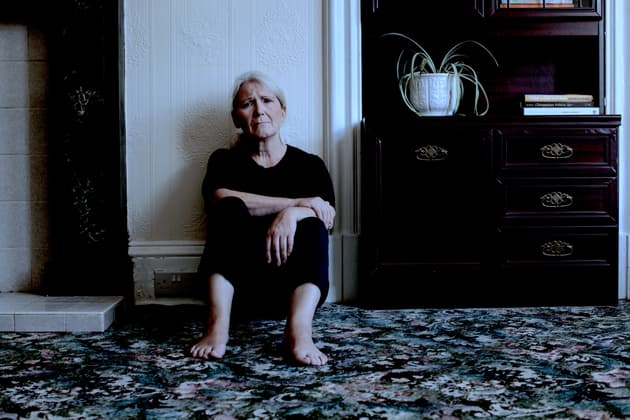 Stock image
via Laura Dodsworth/Women's Aid
Stock image
via Laura Dodsworth/Women's Aid
Karen was left devastated by her encounters with the Metropolitan police five years ago. She called 999 during a violent attack by her then-husband, and following years of controlling behaviour. However in the following days and weeks, she says, police lost crucial evidence, treated her insensitively and let her partner out of custody in the middle of the night, calling her at 1am to tell her he was on the way back to her and her two small children.
In the end she stopped calling the police during attacks. “I just felt devastated. I lost all faith in their ability to protect me at that stage. You live in this naive state where you think if bad things happen we have police and justice system, but those things don't work,” she told the Bureau.
“If they can’t even handle a case where there is clear physical evidence of abuse then I can’t see how they would ever deal with coercive or controlling issues which are more subtle. When you’re a victim of abuse it is hard to tell a neat little story that will tick all the boxes that they are looking for, it just doesn’t come out like that. I think that without in-depth specialist training and dedicated domestic violence officers the coercive, subtle stuff will ever get picked up in a coherent way,” she added. Karen was later helped by a support worker from Refuge.
If you need to talk to someone about domestic violence contact Women's Aid/Refuge free helpline on 0808 2000 247. If you are in immediate danger, call 999.
Main picture, via Laura Dodsworth/Women's Aid
Name of domestic violence survivor above changed for reasons of safety.

